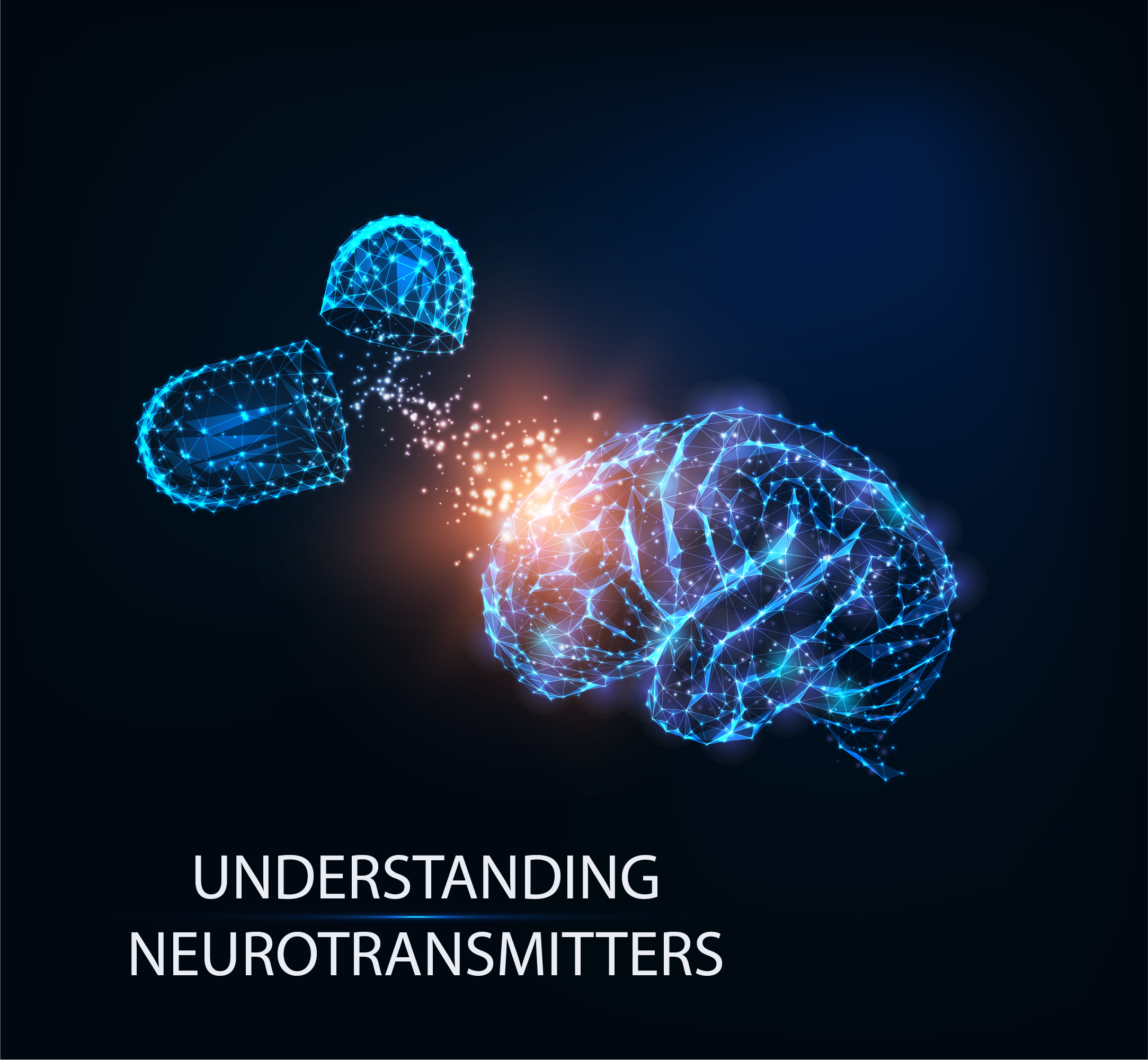Neurotransmitters Gone Wild
The Wellnicity Clinical Team

NEUROTRANSMITTERS are the brain chemicals that communicate information throughout our brain and body. They relay signals between nerve cells, called “neurons.” The brain uses neurotransmitters to tell your heart to beat, your lungs to breathe, and your stomach to digest. They can also affect mood, sleep, concentration, weight, and can cause adverse symptoms when they are out of balance. Neurotransmitter levels can be depleted many ways. As a matter of fact, it is estimated that 86% of Americans have suboptimal neurotransmitter levels. Stress, poor diet, food sensitivities and allergies, neurotoxins, genetic predisposition, drugs (prescription and recreational), alcohol and caffeine usage can cause these levels to be out of optimal range.
There are two kinds of neurotransmitters – EXCITATORY and INHIBITORY. Excitatory neurotransmitters are not necessarily exciting – they are what stimulate the brain. Those that calm the brain and help create balance are called inhibitory. Inhibitory neurotransmitters balance the brain and are easily depleted when the excitatory neurotransmitters are overactive.
INHIBITORY NEUROTRANSMITTERS
SEROTONIN is an inhibitory neurotransmitter – which means that it has an inhibitory effect on the neuron. Adequate amounts of serotonin are necessary for a stable mood and to balance any excessive excitatory (stimulating) neurotransmitter firing in the nervous system. If you use stimulant medications or caffeine on a daily basis it can cause a depletion of serotonin (and other important neurotransmitters) over time. Serotonin also regulates many other processes such as carbohydrate cravings, sleep cycle, pain control, and gut motility. Low serotonin levels are also associated with decreased immune system function and gluten sensitivity.
GABA is an inhibitory neurotransmitter that is often referred to as “nature’s VALIUM-like substance.” The GABA receptor is the target of majority of sleep medications. When GABA is out of range (high or low urine excretion values), it is likely that an excitatory neurotransmitter is firing too often in the brain. GABA will be released in effort to slow down this over-firing. Dopamine is a special neurotransmitter because it can act as both an excitatory and inhibitory neurotransmitter. Having adequate dopamine helps with depression as well as focus, which you will read about in the excitatory section.
EXCITATORY NEUROTRANSMITTERS
DOPAMINE is our main focus neurotransmitter. Examples of inefficient dopamine would be not remembering where we put our keys, forgetting what a paragraph said when we just finished reading it, or simply daydreaming and not being able to stay on task. Dopamine is also responsible for our drive or desire to get things done – or motivation. Stimulants such as medications for ADD/ADHD and caffeine cause dopamine to be pushed into the synapse so that focus is improved. Unfortunately, stimulating dopamine consistently can cause a depletion of over time.
NOREPINEPHRINE is an excitatory neurotransmitter that is responsible for stimulatory processes in the body. Dopamine is converted into norepinephrine by the enzyme dopamine β-hydroxylase, and eventually to epinephrine. Norepinephrine helps to make epinephrine as well. This neurotransmitter can cause ANXIETY at elevated excretion levels as well as some “MOOD DAMPENING” effects. Low levels of norepinephrine are associated with LOW ENERGY, DECREASED FOCUS ability and sleep cycle problems.
EPINEPHRINE is an excitatory neurotransmitter that is reflective of stress. Epinephrine is made from norepinephrine inside the adrenal medulla (the inner part of the adrenal gland). This neurotransmitter will often be elevated when ADHD like symptoms are present. Long term STRESS or INSOMNIA can cause epinephrine levels to be depleted (low). Epinephrine also regulates HEART RATE and BLOOD PRESSURE.
HISTAMINE is an excitatory neurotransmitter that is reflective of ALLERGY or INFLAMMATION in the system, often gut mediated. Elevated histamine will trigger excess stimulation of the respective catecholamines (dopamine, norepinephrine and epinephrine). Often when histamine is high it reflects dysbiosis in the GI tract or underlying offending foods in the diet.
TESTING for neurotransmitter imbalances is, unfortunately, not the current standard of care. Evaluation and treatment of mental health disorders and chemical imbalances relies solely on the individual’s reported symptoms and clinical observation, followed by trial-and-error dosing of pharmaceutical medications. Despite the absence of measured biomarkers, these subjective measures do lead to treatments that are effective for many individuals. However, many of these treatments have detrimental side effects that contribute to treatment failures and may lead to relapse.
Even though neurotransmitter testing has been in use for over sixty years, urine neurotransmitter excretion values alone are not considered diagnostic. To date, there are no tests that can measure live neurotransmitter concentrations in the synapse. However, when combined with a health history it provides objective, relevant insight into the individual’s biochemistry and aids in the development of a truly personalized functional therapy protocol that can provide the natural precursors to the neurotransmitters in question. Wellnicity offers a variety of panels that measure several or all of the neurotransmitters listed above. Are you ready to get to know your neurotransmitters? Get Tested!